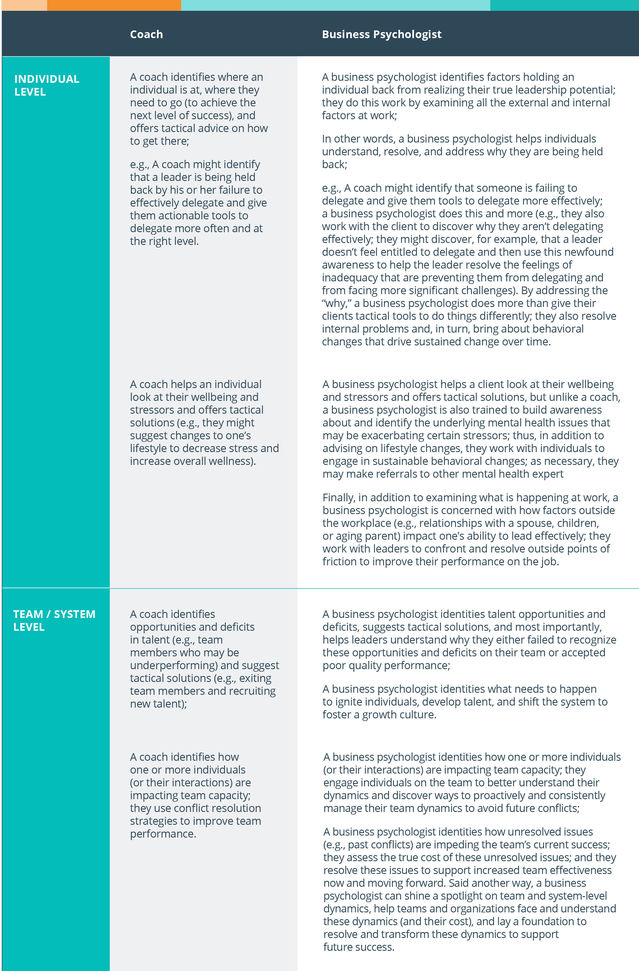Leadership
What Is a Business Psychologist?
How a business psychologist can drive results for you and your team.
Posted April 4, 2020
Leading is complex and hard work. Leaders juggle competing demands. They are also charged with aligning a diverse, distributed, and often distressed workforce. There is unique psychology behind doing each of these things well. This is why more leaders are engaging with psychologists, and not in the traditional way.
As businesses are forced to rethink how they operate, the most competitive businesses are turning to business psychologists. They are doing this to ensure they have the right team, focus, and foundation to navigate the path forward. But what do business psychologists do, and how do they differ from other types of psychologists?
This article explores the foundations of business psychology. First, this article offers a preliminary definition of a business psychologist. Second, it explores the impact business psychologists have on leaders, teams, and organizations. Third, this article outlines how business psychologists work with leaders and teams and how their work with individuals and teams differs from the work carried out by coaches. Finally, this article discusses how to find and contract with a business psychologist.
Business Psychologist Defined
A business psychologist is a coach plus. They do everything coaches do and more. Business psychologists leverage psychological insights to help individuals, teams, and workplaces operate more effectively. They also help executives lead with increased clarity, teams function with decreased friction, and organizations realize ambitious business goals (e.g., increased profits). Most importantly, they do this with an eye to ensuring there are no cracks in the foundation. Business psychologists drill down on underlying problems that might impede success down the line.
Business psychologists have a wide range of specializations from organizational psychology to clinical psychology to community psychology. Drawing on a range of skills and extensive knowledge, business psychologists understand individuals, assess what is happening below the surface (e.g., understand ingrained behaviors that might be impacting an individual’s ability to thrive in a specific system), and identify opportunities. In other words, they understand what is happening at the moment and what is below the surface driving the behavior.
Business psychologists are skilled in understanding the individual and the intersecting system. They understand business dynamics and have a system-level perspective on how businesses operate. But a business psychologist doesn’t need to be an industry expert to help a leader or business thrive. Business psychologists aren’t present to offer advice on finance, real estate, or healthcare. They are brought in as people experts. They delve deep to identify how internal factors (at the individual and team levels) pose obstacles to business success. Only business psychologists have the expertise and training to do this internal work.
Business Psychologist’s Key Areas of Impact
As a coach plus, business psychologists focus on the individual, entire system, and how and why individuals thrive or don’t within specific systems. They offer support on three key levels:
- Leadership and Effectiveness: A business psychologist will frequently start by working with a leader and then help the leader bring their insights to their team and organization. How an executive leads can set the tone for an entire organization. More specifically, business psychologists don’t just tell leaders how to lead or lead more effectively. By digging deep, they also help individual leaders build awareness of their core self, including underlying pathologies and strengths, and how they profoundly impact how they show up on the job, lead, and inspire change. On this basis, a business psychologist is uniquely positioned to help a leader lay a foundation for permanent changes.
- Team Functioning: A business psychologist can help teams identify and fix talent gaps, points of friction, and weak and broken systems. Using assessments, facilitated meetings, targeted training, and retreats, a business psychologist can help a team function more effectively.
- Organizational Impact: A business psychologist can carry out a system-level audit of an organization to identify barriers to success (e.g., aspects of the organization’s structure or culture that may be lowering productivity, compromising retention, etc.).
In summary, business psychologists build on insights from psychology, neuroscience, and business to drive workplace effectiveness and wellbeing at the individual, team, and organization levels. Specifically, business psychologists help individuals, teams, and organizations in the following ways:
- Clarify desired outcomes and dig below the surface to identify and understand internal or external factors blocking the realization of desired outcomes;
- Assess systems, identify breakdowns and gaps, and flag what needs to change (e.g., systemic problems sabotaging progress);
- Increase alignment (e.g., ensure individuals and teams are aligned around a core mandate) and understand factors that may be interfering with alignment;
- Improve decision making and understand how psychology and specific cognitive skills can drive decision-making processes forward;
- Build awareness of options to help leaders see the complexity of any situation; ensure they have the perspective required to be fully aware of all the options, impacts, consequences of their approach;
- Manage bandwidth to help individuals and teams do more by engaging stakeholders in understanding the larger system and identifying/addressing new ways of working/being (e.g., replacing old habits with more productive habits);
- Support talent management (e.g., identifying talent gaps and under-utilized talent resources) to ensure the right people are working at the right level;
- Support workplace culture by embedding the right workplace psychology to drive future success;
- Manage change (e.g., ensuring change is sustainable, scalable, and aligned with core values);
- Improve wellbeing to achieve business goals (e.g., higher productivity, higher retention, higher revenues, and greater impact) by focusing on the mental health and wellness of the entire system (i.e., individual, team, and organization);
- Identify opportunities (e.g., business levers) and gain clarity on which opportunities will yield the greatest impact to drive sustainable change.
How Business Psychologists Work With Leaders and Teams
Business psychologists overlap with coaches (e.g., business coaches, leadership coaches, and executive coaches) but only to the extent that both business psychologists and coaches focus on common system-level changes (e.g., helping individuals and teams get clear on key priorities).
Business psychologists are a coach plus because they also identify and resolve underlying problems. In other words, while good coaches offer helpful tools to improve one’s performance, business psychologists offer the same tools and help clients discover the underlying causes of specific leadership or team functioning deficits. By focusing on tactical solutions and resolving underlying problems, business psychologists are better equipped to fix problems in the present and drive sustainable change over time.

How to Hire a Business Psychologist
Look for credentials (a Ph.D. in psychology) and certifications (Center for Creative Leadership-360, Hogan MVPI, etc.) as a starting point. Beyond that, look to experience. Who have they worked with in the past? You might seek out a business psychologist with a specific specialization (e.g., a venture capital firm may look for someone who is already familiar with the specific challenges of working in the VC and/or startup world). In addition, the ideal candidate will be someone who can anticipate and solve problems before they become a reality.
The best way to assess this is to ask for references from former clients. Outstanding business psychologists will have many clients more than happy to sing their praises. Choosing a business psychologist, like any psychologist, is a personal decision. Above all else, you must feel a resonance with the individual and sense that there is a strong potential to build a trusting relationship over time.




